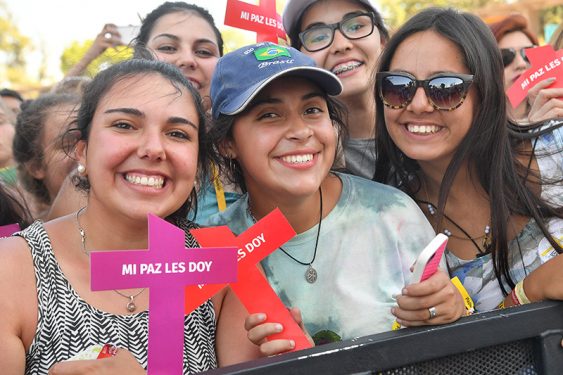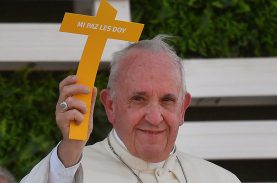
By Inés San Martín, Special to The Tablet
SANTIAGO, Chile – Speaking in a Chilean shrine packed with young people on Wednesday, Pope Francis urged them to continue to be restless and idealists, and not to be put down by “know-it-all” adults who think the young have noble ideas in their hearts only because “they still have to grow up.”
Grown-ups, the pope told the youth, tend to contemptuously say “they will grow up,” but what they really mean is, “they will be corrupted.” Be careful, he added, “allowing yourselves to be bought for two pennies does not mean to mature.”
Related:Pope Francis’ Speech to Youth
“It would seem that with this [idea], that ‘they will mature,’ we adults throw a cold blanket on top of you to shut you up,” he said, speaking from his prepared remarks and adding extemporaneous thoughts here and there.
“It would seem like maturing is to accept injustice… and that is corruption,” he said.

“As if growing up means accepting injustice, believing that nothing can be done, that this is the way things have always been,” he said on Wednesday, during the second full day of his Jan. 15-18 visit to Chile.
Polls and opinion-makers often claim that young people today are flaky, self-centered and too focused on their next adventure to show interest in what’s going on around them. Yet for Pope Francis, young people are called to be “protagonists,” to dream big and to channel their faith-induced excitement, knowing that Jesus is their “power source.”
“Faith excites in young people feelings of adventure, an adventure that beckons them to traverse unbelievable landscapes, rough and tough terrain,” Pope Francis said. “But, then again, you like adventures and challenges! After all, you get bored when there are no challenges to excite you.”
This ability young people have to overcome challenges when presented with the right incentive, the pope said, becomes visible whenever there’s a natural disaster: “You have an amazing ability to mobilize, which is a sure sign of the generosity of your hearts.”
Pope Francis was visibly relaxed talking to the youth, injecting passion to his words, often looking up from his prepared remarks to lead the youth in prayer, or to pointedly question them.
Speaking about an upcoming Synod of Bishops on youth, scheduled for October this year, and a previous meeting of young people in Rome, Pope Francis said he’s called them to help “keep the Church’s face young,” not with makeup or “rejuvenating creams,” but by letting her be “challenged deep down by her sons and daughters, to help her daily to be more faithful to the Gospel.”
The Church, he insisted, is the Holy Mother Church, not the “Holy Grandmother Church.”
At a national level too, Pope Francis said, the Church needs youth to “shake the ground beneath our feet and help us draw closer to Jesus!”
Speaking to the young about their relationship with Jesus, the pope shared an anecdote of a young man once telling him that he gets sad when his phone dies or has no connection because he feels he’s “shut off from the world.”
Pope Francis said that without a connection to Jesus, people end up drowning their thoughts and ideas, dreams and faith, “so we get frustrated and annoyed.”
“It worries me that, once they have lost their ‘connection,’ many people think they have nothing to offer; they feel lost,” the pope said. “Never think that you have nothing to offer, or that nobody cares about you.”
Quoting St. Alberto Hurtado, Chile’s first male saint, and, like Pope Francis, a Jesuit, the pontiff said that that the thought of not being needed or being worthless is the “voice of the devil.”
The pontiff also quoted Hurtado to talk about the “password” to connect to Jesus, which is asking “What would Christ do in my place?” This question, he said, applies in every circumstance in life: at school or university, out dancing or watching sports.
“He is the password, the power source that charges our hearts, ignites our faith and makes our eyes sparkle,” Pope Francis said. “That is what it means to be a protagonist of history. Our eyes sparkle, for we have discovered that Jesus is the source of life and joy.”
According to the pontiff, the young will only be protagonists of history if they transmit that sparkle to those who’ve grown cold and gloomy because they’ve forgotten what it’s like to be hopeful.
“The time will come when you know it by heart, and the day will come when, without realizing it, your heart will beat like Jesus’ heart,” Pope Francis said.
The pope’s remarks took place in a historic landmark in Chile, the Maipu Shrine. In the field surrounding it, one of the region’s most important battles took place, known as the Battle of Maipu, which resulted in the independence of not only Chile but also Argentina.
Before the 1818 battle, the Latin American armies entrusted themselves to Our Lady of Carmen, patroness of Chile, and the Marian devotion to whom the shrine is dedicated.
Two hundred years ago, the Maipu field was also the witness to a memorable hug between the leader of the Latin American armies, Argentine Jose de San Martin and Chilean Bernardo O’Higgins. The gesture was meant to symbolize a brotherhood between their two countries, separated by the majestic Andes.
This is what Pope Francis was referencing when he said that he was glad the meeting was taking place “in this land where the history of Chile began with a fraternal embrace.”
Yet history had other plans for the two countries. Chile and Argentina were close to going to war in 1978 over the Beagle Channel. It’s been widely acknowledged that it was the papal mediation of John Paul II that stopped it.
Earlier in the day, the pope said Mass in Temuco, in southern Chile, in a region afflicted by a centuries-old conflict between the government and an indigenous population called Mapuche.
During his homily, the pontiff said that violence is never a good way to make one’s plight known, while also condemning the violence of “elegant agreements that will never be put into practice,” thereby falsely stoking people’s hopes for change only to see them disappointed.
After his meeting with the youth, he was scheduled to address Chile’s intellectuals at the local Catholic University, before calling it a day.
Pope Francis will be in Chile until Jan. 18, when he’ll move on to Peru, for a three-day visit.
